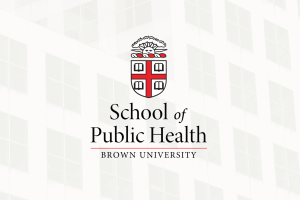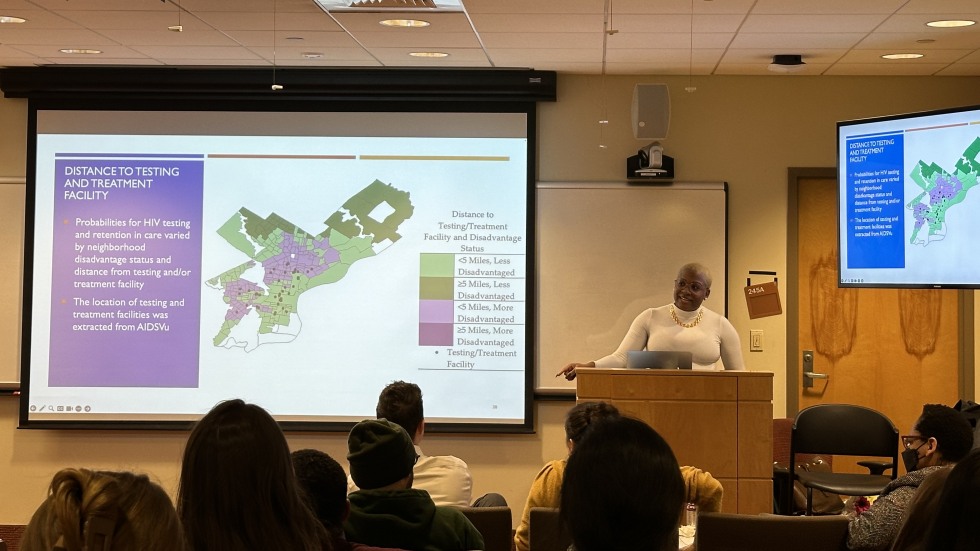Department of Health Services, Policy & Practice
Doctoral program.


Apply to our program
Start the next chapter of your career by studying health services at Brown University.

Program Handbook
Health Services Research Doctoral Program Handbook 2023-2024 Academic Year
Advisor Handbook
Health Services Research Doctoral Program Advisor Handbook 2023-2024 Academic Year
The Health Services Research (HSR) doctoral program offers training in research methods to advance knowledge of issues central to the improvement of population health by focusing on organizational characteristics of health care delivery systems, providers and economic forces that shape consumer and provider behavior, as well as the policy environment in which these relationships exist.
The competency-based curriculum provides students with a strong analytic foundation and general health services research orientation. Students may select an emphasis area in Pharmacoepidemiology and Pharmaceutical Health Services Research, Health Economics, and Comparative Effectiveness Research and Evidence-based Medicine.
Ph.D. in Health Services Research
Dive into the curriculum, proficiencies, and highlights of our doctoral program
Program Highlights
- Faculty who are leaders in the field of health economics, synthesis, aging, and health policy
- Outstanding student-to-faculty ratio
- Opportunities to engage in research from your very first semester
- Opportunities for teaching including an optional teaching certificate
- Training in grant writing (many students obtain federally-funded dissertation grants)
- Guaranteed funding for up to five years, including summers
- Opportunities to work on applied research projects with external partners
The Health Services Research (HSR) doctoral program in offers training in research methods to advance knowledge of issues central to the improvement of population health by focusing on organizational characteristics of health care delivery systems, providers and economic forces that shape consumer and provider behavior, as well as the policy environment in which these relationships exist.
Students may opt to take a general HSR track or an emphasis area in:
- Pharmacoepidemiology
- Health Economics
- Comparative Effectiveness Research and Evidence-based Medicine
- or a customized analytic track.
Core courses:
- PHP2446: HSR Doctoral Seminar: Financing & Delivery (Fall semester), required for Year 1
- PHP2447: HSR Doctoral Seminar: Quality & Equity (Spring semester), required for Year 1
- PHP2090: Research Grant Writing for Public Health, required for Year 2
- PHP2150: Foundations in Epidemiologic Research Methods, elective
- PHP2200: Intermediate Methods in Epidemiologic Research, required in Year 1
- PHP2510: Principals of Biostatistics and Data, elective
- PHP2511: Applied Regression Analysis, elective
- PHP2455A: Health Services Research Methods I, required for Year 2
- PHP2455B Health Services Research Methods II, required for Year 2
- PHP2980: Graduate Independent Student Study and/or Thesis Research
Students are also expected to:
- Complete PHP1001, an online, noncredit introductory course
- Complete a noncredit online introductory course on Stata (required Year 1)
- Participate in the journal club series
- Complete the noncredit Responsible Conduct in Research (RCR) course
Within the Department, the major requirements for the Ph.D. are:
- Completion of three years of course work (two with a prior graduate degree)
- Demonstration of reaching experience via one TAship and one Teaching Experience with a focus on course design
- Synthesis of a core body of knowledge, evaluated via written examination.
- Demonstration of readiness to undertake original research, via oral presentation of prospectus or written dissertation proposal (oral exam).
- Submission of a dissertation grant to an external funder.
- Completion and oral defense of a dissertation that makes an original contribution to the chosen field of study
Upon completion of the Ph.D. program, students are expected to have proficiency in the following areas:
- Developing a strong foundation in contemporary approaches to health services research
- Designing a research study that can appropriately and efficiently examining a health services research question; writing and submitting a proposal to support and fund this research
- Conducting appropriate analyses of health research data using standard regression models in Stata, SAS or R
- Distinguishing between association and causation based on counterfactual theory to make causal inference using data obtained from experimental and quasi-experimental studies
- Learning to interpret and integrate multiple lines of scientific evidence concerning a particular topic of importance to the field of health services research
- Communicating scientific finding effectively
- Demonstrating mastery of a substantive area
- Reviewing, critically analyzing and synthesizing existing health services research literature to identify meaningful gaps in current knowledge and formulate research objectives
Ph.D. Funding
As a result of Brown's commitment to high quality education, all students admitted into the Ph.D. program receive full scholarships that include tuition, healthcare and a research-assistant-based stipend for five years of graduate study.
Health Services Research (HSR) Doctoral Program Contacts
Amal trivedi, alyssa bilinski, emmanuelle belanger, recruit our students.
Connect with our students and soon-to-be graduates seeking career opportunities.

Invaluable Relationships
Fostering student-faculty relationships is a pivotal component to student success at the School of Public Health.
Health Services Research Hour
We look forward to meeting you and answering your questions about Health Services Research!
Department of Epidemiology
Doctoral program.
- Academic Programs

Ready to apply?
Start the next chapter of your career by studying epidemiology at Brown University.
Epidemiology Department Doctoral Program Handbook
This Handbook is intended to give an overview of the Epidemiology doctoral program at Brown University’s School of Public Health.
Doctoral candidates undergo rigorous training in epidemiologic methods. We prepare students to become leading, independent investigators. Our graduates excel in academia, industry, government and public health practice.
The Doctoral Program in Epidemiology’s mission is to prepare students to become leading, independent investigators with rigorous training in epidemiologic methods, able to excel in academia, industry, government or public health practice. Using sophisticated study designs, statistical analyses, field investigations, and laboratory techniques, epidemiology students investigate the cause of a disease, its distribution (geographic, ecological, and social), method of transmission, and measures for control and prevention.
All students in the Doctoral Program in Epidemiology are required to demonstrate mastery of advanced epidemiologic methods, which is assessed via coursework and examinations. For more information about our program, please check out our Doctoral Program Handbook:
Epidemiology Department Doctoral Program Handbook 2024-2025

Courtney Choy, pictured answering questions about her Public Health Research Day poster, conducts data collection for the Ola Tuputupua’e study and supports the research efforts of the Obesity Lifestyle and Genetic Adaptation (OLaGA) group in Samoa.

Professor Eric Loucks, Director of the Mindfulness Center at Brown, studies the impacts of mindfulness and early life adversity on adulthood well-being.

The doctoral dissertation defense is the culmination of at least four years of study and research. A major academic and career milestone presented before a live audience, successful PhD defenses are celebrated with colleagues, friends, family, and a champagne toast.
- Faculty who are leaders in the field
- Outstanding student to faculty ratio
- Numerous research possibilities
- Emphasis on teaching
- Training in grant writing (more than half of our recent F31s submitted received funding in their first round)
- Guaranteed funding
- Opportunities to work on applied projects at RI State Department of Health; nearby RI hospitals
Upon completion of the PhD program, students are expected to have proficiency in the following areas:
- Develop a strong foundation in contemporary approaches to epidemiologic methods, and major observational study designs
- Design a research study that can appropriately and efficiently examine an epidemiologic research question of interest; write and submit a proposal to support this research
- Use causal diagrams to identify threats to study validity and potential approaches to mitigating such threats
- Conduct appropriate analyses of epidemiologic data using standard regression models in SAS or R
- Distinguish between association and causation based on counterfactual theory to make causal inference using data obtained from observational studies
- Represent a priori subject- matter knowledge and hypotheses with causal diagrams
- Understand the difference between effect modification and interaction
- Learn to interpret and integrate multiple lines of scientific evidence concerning a particular topic of importance to the field of epidemiology
- Effective communication of scientific findings
- Demonstrate a basic understanding of human physiology and pathophysiology
- Demonstrate mastery of a substantive area
- Review, critically analyze and synthesize existing epidemiologic literature to identify meaningful gaps in current knowledge and formulate research objectives
- Strong understanding of what scientific misconduct is and the impact unethical conduct can cause within and outside of the research community.
All students in the PhD program in Epidemiology are required to take 13 courses for credit, including 8 core courses, 2 or 3 more methods selective courses, and 2 or 3 more substantive selective courses. Each of these courses must be taken for credit and for a grade. PhD students are also required to: a) take PHP1001, an online, noncredit introductory course b) take a noncredit online introductory course on SAS data management, c) participate in the journal club series (course credit optional), and d) take the noncredit Responsible Conduct in Research (RCR) course.
Core Courses:
- PHP 2150 – Foundations in Epidemiologic Research Methods
- PHP 2200 – Intermediate Methods in Epidemiologic Research
- PHP 2250 – Advanced Quantitative Methods for Epidemiologic Research
- PHP 2180 – Interpretation and Application of Epidemiology
- PHP 2510 – Principles of Biostatistics and Data Analysis
- PHP 2511 – Applied Regression Analysis
- PHP 2090 – Research Grant Writing for Public Health
- PHP 2130 – Human Biology for Epidemiology
Our Commitment to Program Diversity and a Culture of Respect
The Brown University Department of Epidemiology is committed to ensuring that we admit students from diverse socioeconomic, cultural, racial, and ethnic backgrounds.
The Department of Epidemiology is committed to creating an inclusive, collaborative climate centered on mutual respect, with the goal of cultivating a productive work and learning environment.
Ph.D. funding
As a result of Brown’s commitment to high quality education, all students admitted into the Ph.D. program receive full scholarships that include tuition, healthcare and a research-assistant-based stipend for five years of graduate study.
Graduate Program Director

William Goedel
William C. Goedel, PhD [he/him] is an assistant professor in the Department of Epidemiology at the Brown University School of Public Health. He is a social epidemiologist, with significant methodological expertise in the use of geographic information systems (GIS) to guide public health policy and practice. His research uses spatial analytical techniques to quantify the burden of many of the United States' most pressing public health challenges varies from neighborhood to neighborhood, with a particular interest in identifying areas that are overburdened and underserved as points of focus when resources are limited. He currently teaches "Fundamentals of Epidemiology" (PHP 0850), "Foundations of Spatial Analysis in Public Health" (PHP 2015), and "Interpretation and Application of Epidemiology" (PHP 2180). As a scholar of teaching and learning, Dr. Goedel is interested in the implementation and evaluation of graduate admissions review processes and novel grading systems that value both a learner's accomplishments to date and their potential for growth over time regardless of their background. He received his undergraduate degree with a joint major in global public health and sociology from New York University's College of Global Public Health in 2017 and his doctoral degree in epidemiology from Brown University's School of Public Health in 2020.

IMAGES